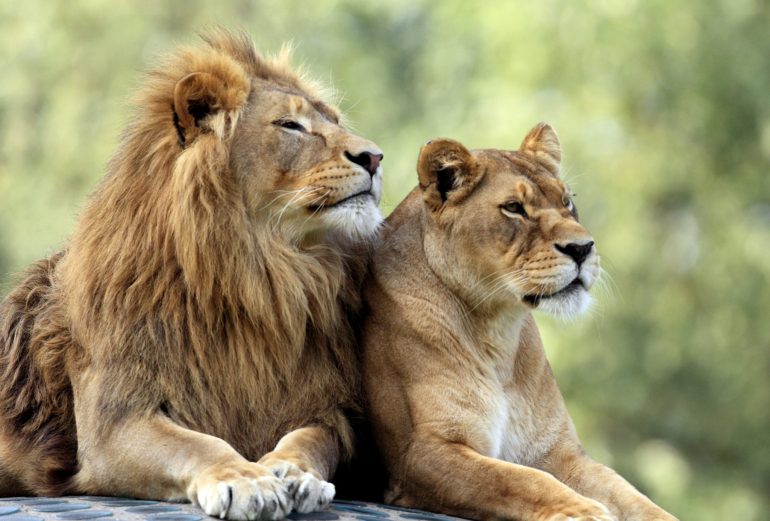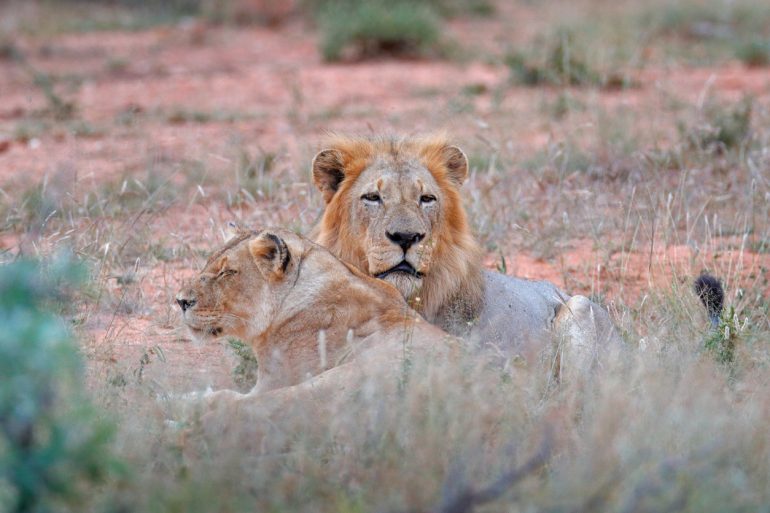The lion is the King of Beasts; an icon of strength and majesty. An apex predator, it sits at the top of the food chain, not hunted by any other animal in the wild. On the surface, it’s hard to see such a powerful animal as vulnerable. However, a lion’s life is pocked with dangers, both large and small, each one proving a threat to its mortality. We’ll explore what factors affect the lion lifespan and seek the answer to one main question, how long can a lion live?
How Long Can A Lion Live?

Black Maned Lion, Lying and Looking Around (Photo: DavidPapenfus via iStock)
How many years do lions live? The answer to this question depends on many factors. But first and foremost on whether the lion is living in the wild or in captivity. This is, without a doubt, the biggest factor in estimating lion lifespan.
How Long Do Lions Live in the Wild?

A black-maned wild lion climbing a rock (Photo: PedroBige via iStock)
Lions who live in the wild face a multitude of threats from the moment they’re born. From starvation and disease to attack from other lions or injury in the course of hunting, wild lions have the odds of survival stacked firmly against them. The biggest threat by far however, is humans. Not just because of hunting and poaching, but also loss of habitat and other factors which contribute to natural difficulties.
Overall, lions can expect to live to between 10 to 14 years of age in the wild. Lion lifespan is higher on average for females.
It is also generally accepted that – across all age groups – most lions die in violent circumstances. Lions are at greatest risk as cubs, with only 1 in 8 estimated to make it to adulthood. What’s more the threat is often not from outside, but from other lions. While a cub’s father remains head of its pride, the cub is relatively safe. However, it is only a matter of time before intruder males attempt a takeover. And if those intruders succeed, everything changes.
The new males will want to mate with the lionesses, which won’t happen for up to ten months while a litter is still being weaned. It is only by killing the cubs that the females will come back into estrus and agree to mate again. The solution is simple, but brutal. The new males will kill the cubs. The rate of such infanticide varies by location, but figures suggest that up to a quarter of cubs in the Serengeti are lost in this way.
The lionesses also face a risk to their mortality in this situation, as they fight to defend their cubs against the bigger males.
Assuming they reach two or three years of age, the male cubs then take on the challenge of leaving the pride so they can go out and create their own. This involves numerous dangers to the young lions, not least of which is the need to fight other males to take over a pride.
How Long Do Lions Live in Captivity?

Adult Lion and Lioness (Photo: Bernard Bialorucki vis iStock)
Lions can live far longer in captivity than in the wild. Living in a zoo or other controlled environment removes many of the threats faced by their wild counterparts. So, how long do lions live in captivity? Around 20 years on average. And the oldest lion is said to have lived in India, an Asiatic lion called Arjan. He lived to around 26.
A Life Full of Danger

Portrait of pair of African lions, Panthera leo, in Kruger National Park South Africa. (Photo: Ondrej Prosicky via iStock)
The disparity between lion lifespans in the wild versus the lifespan of a lion in captivity reveals just how difficult it is for wild lions to survive. It demonstrates that, for wild lions, the answer to the question ‘how long can a lion live’ is very different to that of ‘how long do lions live?’ Because unless a lion is strong, smart and lucky, they are unlikely to reach a ripe old age.












